Do you have any "slovenly" 1795-96 coins?
 RogerB
Posts: 8,852 ✭✭✭✭✭
RogerB
Posts: 8,852 ✭✭✭✭✭
The Mint Director was unhappy with coins produced in the first part of 1796. He called them "slovenly and unworkmanlike" among other words of displeasure. Maybe you can still return them for replacement or refund?
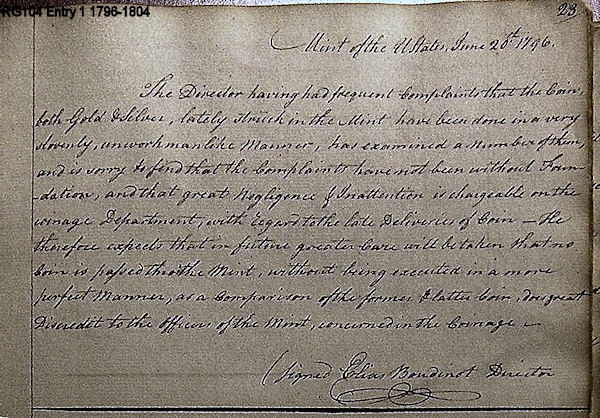
Yep, this is kind of hard to read mostly because of the original image quality.
5
Comments
Nice find!
I just got one that I chose specifically FOR its wornoutishness.
Sold a scratched 1795 half dime recently.
Yep you can still see the poor weight correction.
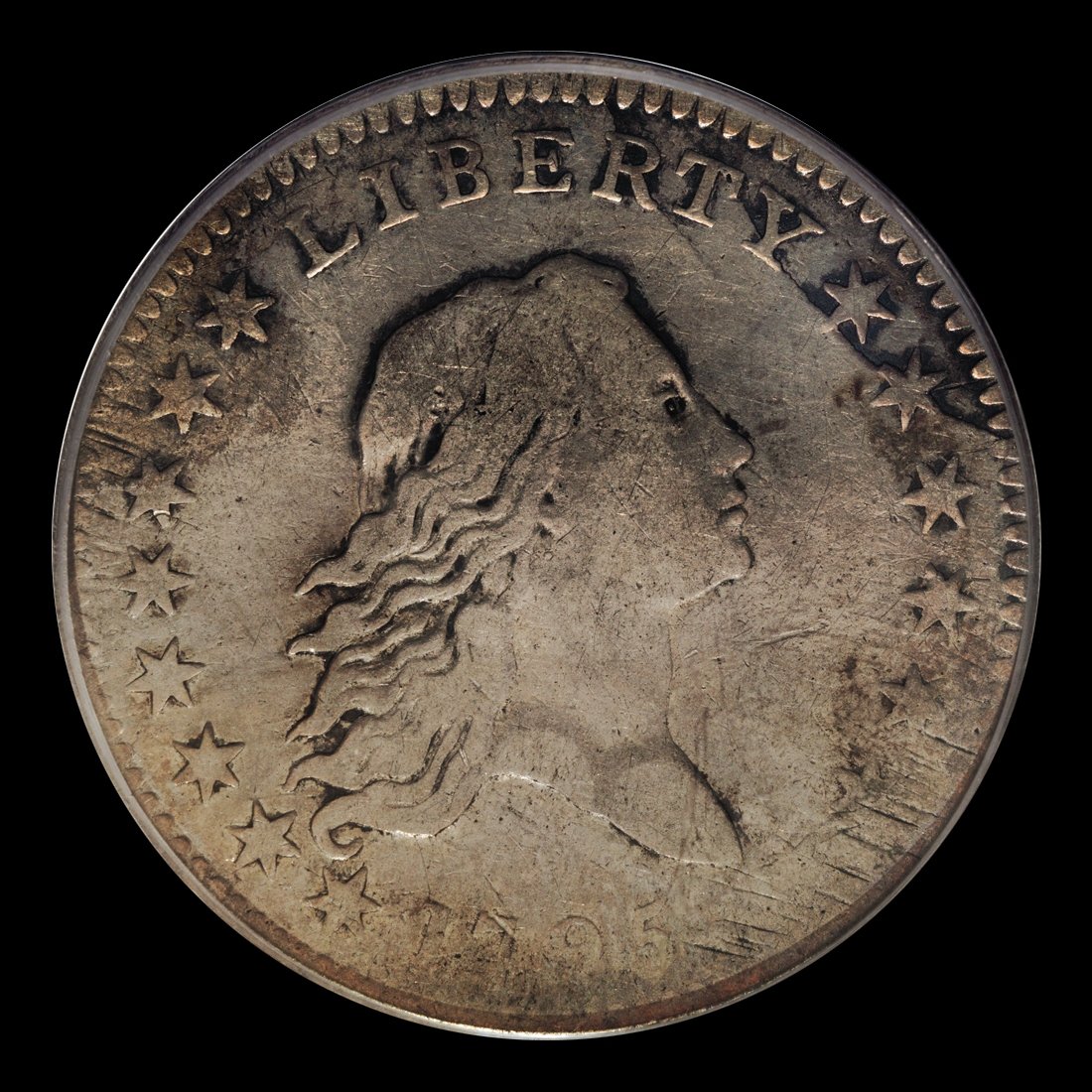
Yes, the die crack through the date is slovenly and unworkmanlike, where do I exchange for one 2017 dime?
also, the reverse die cracks caused uneven wear and bothered people during ancestor circulation and collector ownership...
I'd like to sue for another billion dimes for 221 years of painful irritation and OCD suffering in my family tree?
Liberty: Parent of Science & Industry
@RogerB, do you have a "translated version" of the document you posted that you could post here? Thanks.
W. David Perkins Numismatics - http://www.davidperkinsrarecoins.com/ - 25+ Years ANA, ANS, NLG, NBS, LM JRCS, LSCC, EAC, TAMS, LM CWTS, CSNS, FUN
Hold on...I'll do a quick transcription.....
"Mint of the United States
June 20, 1796
The Director having had frequent complaints that the coin, both gold and silver, lately struck in the Mint have been done in a very slovenly, unworkmanlike manner, has examined a number of them, and is sorry to find that the complaints have not been without foundation, and that great negligence of inattention is chargeable on the Coinage Department, with regard to the late deliveries of coin. He therefore expects that in future greater care will be taken that no coin is passed through the Mint, without being executed in a more perfect manner, as a comparison of the former and latter coin, does great discredit to the officers of the Mint, concerned in the coinage.
/s/ Elias Boudinot, Director."
And NOW, all they do is "forget" to put mintmarks on PROOF coins.
Slovenly - I guess - certainly well worn, and I still had to pay a bunch for them:
I should of kept my 1794 LC.
I sold it a few years back for more than I bought it for, looked about the same as Walkerguy21d's 1796 example.
I have a couple but they were slovened post mint by others throughout the years.
"If I say something in the woods and my wife isn't there to hear it.....am I still wrong?"
My Washington Quarter Registry set...in progress
I'd love to show a bust half. But I promised the missus no mortgage.
Lance.
Boudinot is the guy who complained about the Mint from the outside and then got in put in charge of it. This letter was written early in his tenure. I bet he backed off after figuring out how hard it really was.
The coins from the Mint up to the time the letter was written had an assortment of planchet laminations, brockages, massive die cracks, off center and double strikes, and heavy adjustment marks. All of these continued well after 1796, except adjustment marks showed usage of finer files, the adjustments marks were not nearly as heavy as some of the gouges found in 1794-1796 (with a few exceptions). Since only silver and gold coins were mentioned, could adjustment marks have been the primary complaint?
One of the most interesting aspects of the letter is the "frequent complaints," that indicate the public was concerned with the quality of the coinage from the Mint. Aside from the letter, there were just a few newspaper accounts of public complaints, and these were complaints of the designs, and not the coining quality.
Here is a slovenly 1795 three leaves half dollar
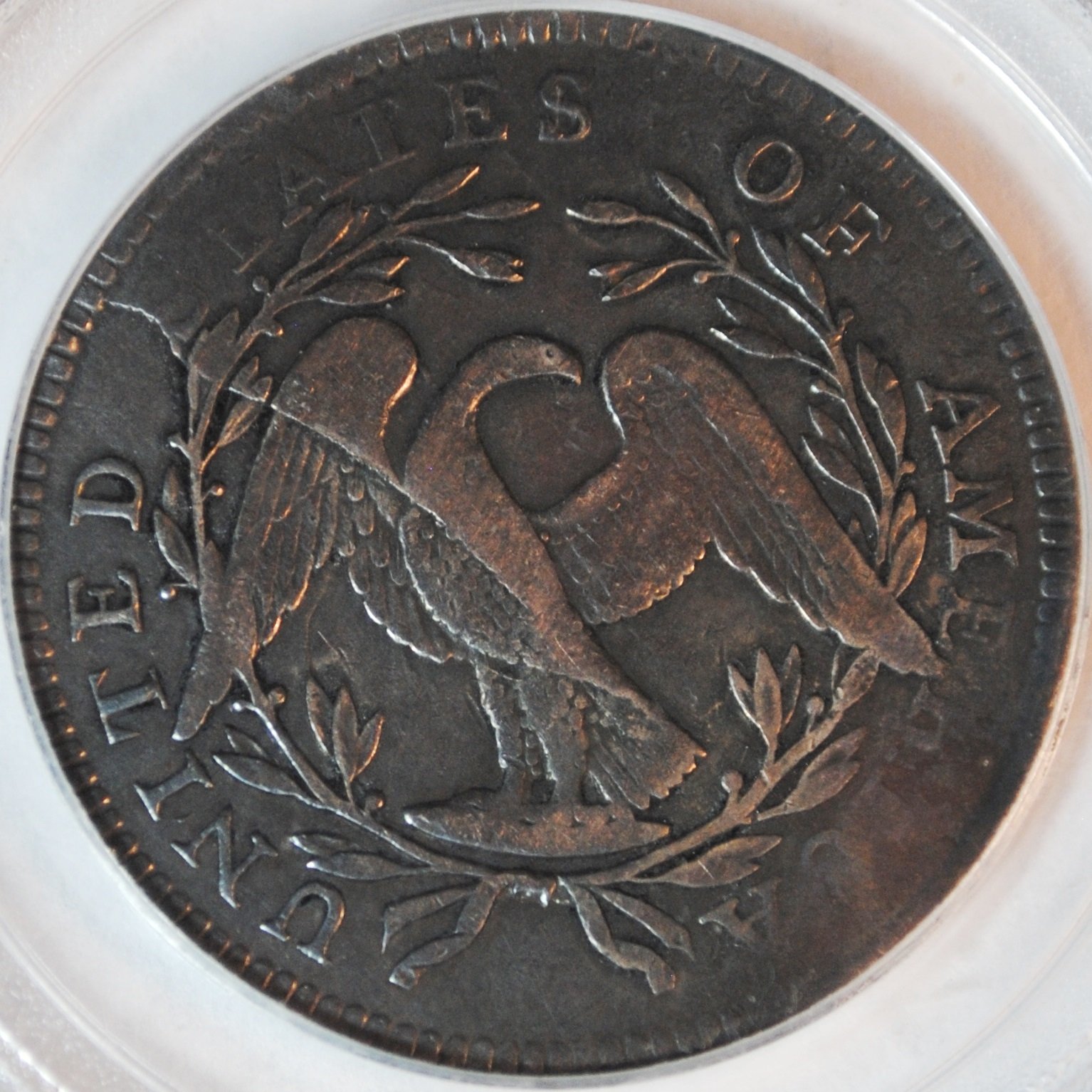
I really am impressed with these old letters that have survived over 200 years in files...some coins have not done as well.....@RogerB...Thanks for posting these and other factual information you find in your research. Really adds to the hobby.... Cheers, RickO
RE: "Since only silver and gold coins were mentioned, could adjustment marks have been the primary complaint?....One of the most interesting aspects of the letter is the "frequent complaints," that indicate the public was concerned with the quality of the coinage from the Mint."
Although the coins went to depositors, most depositors were either bullion brokers/exchange agents, or the Bank of the United States. Thus, they were often the first to see new coins. I suspect the complaints were that sloppy coinage made counterfeiting much easier.
Nysoto, was there a noticeable improvement in gold/silver coin quality in 1797? (Beyond the adjustment marks.)
There are many interesting letters and documents. Sadly, much more has likely been destroyed, and that makes assembling the full story impossible. In this instance, was there a response from Coiner Voit? A related note from Bank of US? A congratulatory note to the Coining Department for improvements? Or---just silence?
For silver, planchet laminations and flaws were rare 1794-96, and still occurred after 1796, there may have been a slight improvement but this would be difficult to measure. The other anomalies that I mentioned such as brockages, off-center and double strikes were also rare and still occurred beyond 1796. Massive die cracks were still common, although die life was much longer. Cuds were common until late 1806, when the Mint evidently changed to cone-shaped working dies (per Sholley), at least for half dollars.
For gold, I am not aware of planchet laminations or visible defects 1794-96, and Dannreuther does not specifically mention examples in his early gold book. Gold also struck better than silver, and Karoleff and others state that some weak struck silver coins were from improperly annealed blanks. Doug Winter has stated that alloy variations in early gold can be seen from the color of toning (such as green or red toning). Possibly, or is this environmental? Gold coin die cracks and cuds were similar in frequency to silver coin dies.
There are some examples of heavy adjustment marks on 1794-95 coins that nearly obliterate the portrait of Liberty, search Heritage for examples.
To summarize, there does not appear to be a noticeable improvement in gold/silver coin quality in 1797, beyond adjustment marks.
I own the worst (or best?) example of 1794-96 silver planchet lamination that I have seen, it is extremely slovenly, plated on page 407 in Steve Tompkins Early United States Half Dollars. The lamination wipes out most of the date and much of the lower part of the coin. I don't have a handy pic, but here is the Heritage link from the auction lot that I won https://coins.ha.com/itm/early-half-dollars/half-dollars/1795-50c-fine12-anacs/a/23051-13201.s
Even with a well manufactured planchet, a nice clean strike, with uncracked dies, it's difficult to overlook an A punched over an E, or visa versa. My 1795 half dollar and dollar both have this feature. If someone were to contemporaneously survey the mint's output, it would indeed be a long list and some very interesting statistical trends as they learned how to coin better.

Edit: found picture of dollar
Liberty: Parent of Science & Industry
Nysoto - I checked the Tompkins book -- yes, that one is a mess!
RE: "...alloy variations in early gold can be seen from the color of toning (such as green or red toning). Possibly, or is this environmental?"
The standard alloy was 1/3 silver, 2/3 copper. This was done to produce coins with the approximate color of pure gold. Those proportions seem normal for several decades.
Every "answer" seems to raise new "questions." Such is the game.
Here is another one of those slovenly broken over dated half dollars
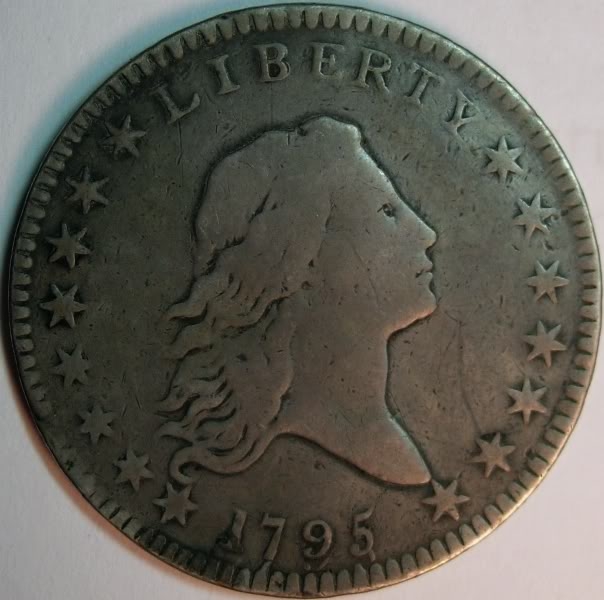
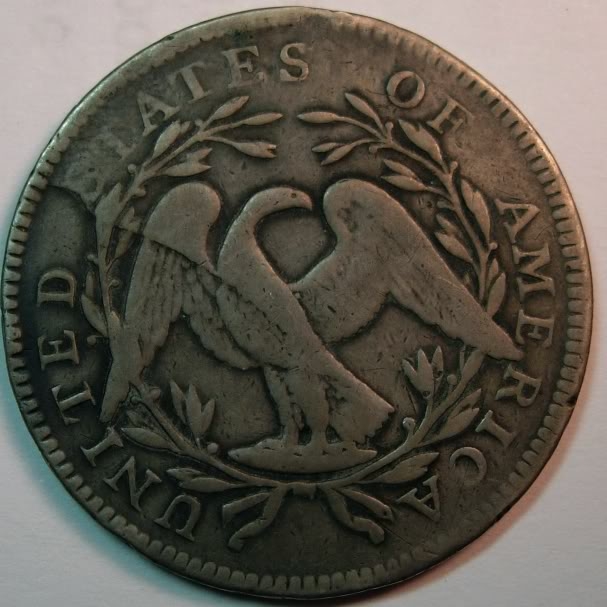
Only speculation, but sometimes letters like this are written for political purposes unrelated to the substance set forth. I recall that years later when Longacre was at the Mint there were certain factions that wanted him replaced.
"...but sometimes letters like this are written for political purposes unrelated to the substance set forth."
That's true. In this instance, the letter looks more like an internal memorandum - it has no addressee. Boudinot occasionally had notices "written in a plain hand" posted in the Mint buildings to remind employees of rules or special circumstances, i.e., no cigar smoking; don't borrow the horses; show up on time, etc.
Longacre's situation was somewhat strange and will be the subject of a research article.
Die breaks on the obverses, too.
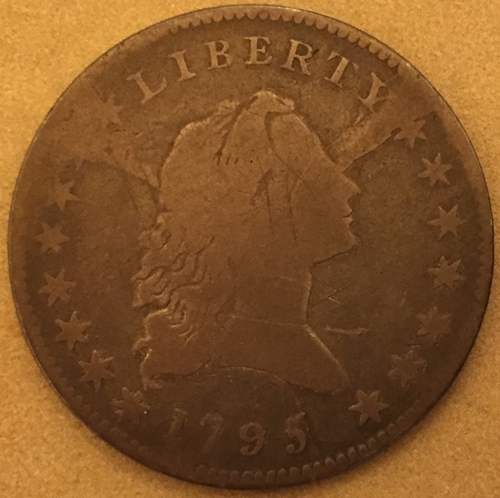
Half dollar - sorry for the poor cell-phone image
And a half dime with (post-mint damage) and an obverse cud.
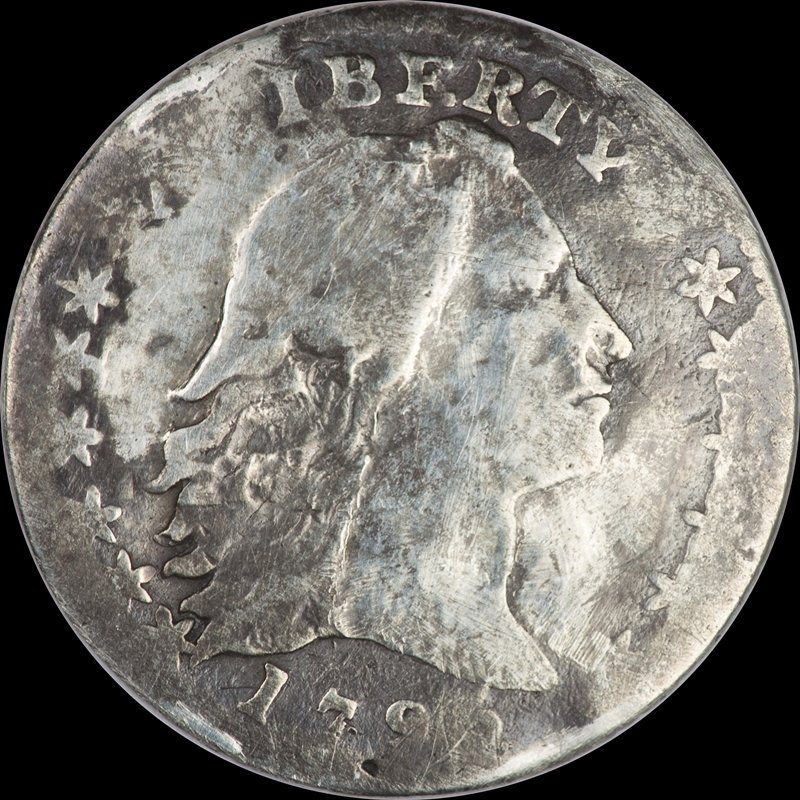
Pacific Northwest Numismatic Association